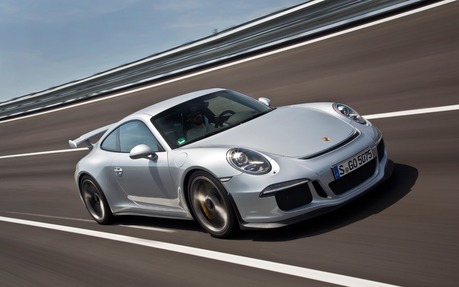2014 Porsche 911 GT3: The Athlete in the Family
With a 3.8-litre naturally aspirated engine that produces 475 horsepower and howls at 9,000 rpm, a chassis optimized for track driving, and Michelin Pilot Sport Cup 2 tires that are practically slicks, the 1,430-kg 911 GT3 is THE Porsche for true connoisseurs who are quick to push it to the limit on the track. We tested the fifth-generation of the most radical of 911 Carrera at the Aldenhoven Testing Center near Düsseldorf, Germany.
Style-wise, the GT3 has typical race-car aerodynamic features: front end openings, a fixed rear wing and centre locking alloy rims. The GT3 is a two-seater and its rev counter bears the GT3 inscription, but those are the only aspects of the passenger compartment that set the athlete in the family apart from the rest of the 911 Carrera line-up. At no extra charge, European buyers can opt for the even sportier Clubsport Package, which includes a roll cage, racing harness and fire extinguisher, but they’ll have to shell out an additional €3,000 if they want sport bucket seats. Note that neither the bucket seats nor the Clubsport Package are available in Canada.
State-of-the-art technology
The 911 GT3 uses an evolved version of the 3.8-litre naturally aspirated flat-six that equips the 911 Carrera S. This represents a break with the past, as previous generations were based on competition-derived engines or the GT3 RS 4.0’s 500-hp mill. For the GT3, this “new” engine block with dry sump has been optimized with a revised intake, titanium connecting rods, aluminum forged pistons and a new crankshaft. Much to the dismay of purists, gone is the manual transmission; the GT3 is now comes with the PDK twin-clutch gearbox only. Like the 911 Turbo and Turbo S, the GT3 is equipped with rear-wheel steering that turns the rear wheels 1.5 degrees away from the front wheels when the car is going less than 80 kilometres/hour. Beyond that speed, the rear wheels turn in the same direction as the front wheels. What’s more, it has a Porsche Torque Vectoring Differential (PTV), which works much like an electronic limited slip differential.
The track at the Aldenhoven Test Center is where the GT3 can truly express itself. Although launching is very impressive with the Launch Control system, the thrust is not as visceral as with the 911 Turbo, which we also tested the same day for comparison’s sake. However, the GT3 takes off with confidence and authority just the same, emitting a much more evocative sound when the naturally aspirated engine flirts with 9,000 rpm. The 911 Turbo charges harder, but its turbocharged engine is more discrete. The GT3’s true personality shines through on the Handling Track. More direct, more playful and more balanced than the 911 Turbo, the GT3 strings transitions together with disconcerting agility and handles almost like a mid-engine sports car, which is very surprising considering its configuration with everything at the back. Even with the electronic stability control system on, it is possible to provoke and maintain pleasant skids as often and as long as the angles aren’t too pronounced. If you overdo it, the system intervenes just enough for the driver to regain control of the car without abruptly affecting the inspired ride. As for performance, the GT3 is more dynamic than the 911 Carrera and it breaks new ground for the line-up by also being very easy to drive. You can lunge into curves very quickly; it is remarkably easy to position the GT3 exactly where you want it and you can exit corners with authority. Braking is just as impressive, with power and stamina that would make many sports cars green with envy.
We took the long way back to Düsseldorf, including a 90-kilometre loop on back roads and a sprint on the autobahn, where traffic density kept us to a maximum speed of 235 kilometres per hour. That helped us appreciate the GT3’s incredible docility at low speed and its magnificent stability at high speed. For everyday driving, you’ll just have to learn to deal with a more firmly calibrated suspension and more pronounced engine noise in the passenger compartment. Dynamic without being too radical, the GT3 is the version that has remained the most faithful to the 911’s philosophy. This will please enthusiasts with at least $148,400 to pick up the base trim.
| Test drive report | |
| Test model | 2014 Porsche 911 |
|---|---|
| Trim level | GT3 |
| Price range | $96,200 – $206,600 |
| Price as tested | 148 800 $ |
| Warranty (basic) | 4 years/80,000 km |
| Warranty (powertrain) | 4 years/80,000 km |
| Fuel economy (city/highway/observed) | 18,9 / 8,9 / N/A L/100km |
| Options | N/A |
| Competitive models | Aston Martin Vantage, Audi R8, BMW 5 Series, Chevrolet Corvette, Jaguar XK, Nissan GT-R |
| Strong points |
|
| Weak points |
|
| Editor's rating | |
| Fuel economy | In automatic mode, the PDK gearbox shifts very quickly to improve fuel consumption in normal driving conditions |
| Value | The most dynamic 911 is also the one that remains most faithful to the spirit of the line |
| Styling | A rear wing that is a tad “boy racer” for some but the rest is in good taste |
| Comfort | Much more Spartan than the other versions in the line-up |
| Performance | It’s hard not to like the engine’s war cry at 9,000 rpm and, especially, the GT3’s spectacular performance |
| Overall | Unbridled love... |
